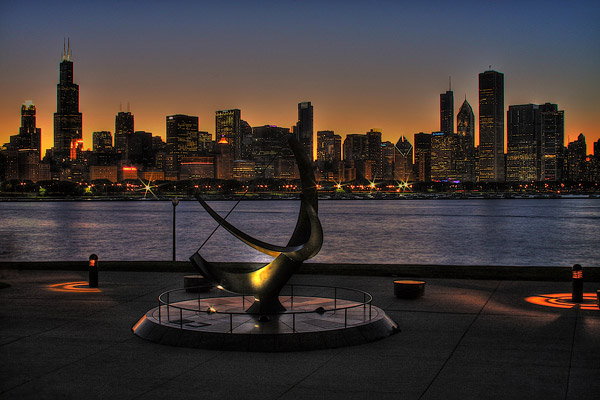
At City Journal, Harvard economist Edward Glaeser, author of Triumph of the City, makes the case that Republicans should be much more competitive in America's major cities (via Roy Edroso). It's a problem for them in an urbanizing country, and while it seems unrealistic to think that the GOP could overturn decades of Democratic rule, it's also not unthinkable that they could make modest inroads and provide something of a counter to urban Democrats. But it won't happen until the party embraces cities.
Glaeser is in favor of this, but he doesn't seem to appreciate the depth of the problem. For instance:
The 2012 party platform, by contrast, had no city-oriented policies whatsoever and used the word “urban” just twice—once to decry the current administration’s allegedly “replacing civil engineering with social engineering as it pursues an exclusively urban vision of dense housing and government transit.”
He rightly argues that this is absurd, given the administration's actual record. But if we're using the GOP party platform as an indicator (and party platforms are a hodgepodge of generally accepted beliefs and semi-fringe sops), it's notable that Agenda 21 snuck into it: "We strongly reject the U.N. Agenda 21 as erosive of American sovereignty, and we oppose any form of U.N. Global Tax."
Agenda 21 (not to be confused with the Glenn Beck novel) is a very long, not terribly new, non-binding UN agenda broadly centered around the idea of sustainability, covering everything from anti-poverty measures that one would think Republicans would embrace ("recognize and integrate informal-sector activities into the economy by removing regulations and hindrances that discriminate against activities in those sectors") to mom-and-apple-pie agrarianism ("a farmer-centred approach is the key to the attainment of sustainability in both developed and developing countries") to SOP environmentalism ("integrated management and sustainable development of coastal and marine areas and their resources, at both the local and national levels").
It's very, very broad. It covers a bit of everything; it's general idea is to do the things that countries do, but more sustainably. But it's been translated into "a global conspiracy to trample American liberties and force citizens into Orwellian 'human habitation zones,'" a funhouse mirror that looks at 21st century urbanism and sees a combination of the Great Leap Forward and Blade Runner, even though an entire section of Agenda 21 has to do with rural development.
Glenn Beck has "words to watch" to make sure you're not being funneled into Agenda 21. It's basically… everything cities are going to do for the next few decades.
Greenways, High Speed Rail, Land Use Policies, Livable communities, Livable Communities, Local, Metropolitan Planning Organizations (this one is also kind of a biggie, actually), Mixed Use Development, Multi-Use Dwellings, Open Space, Parking Policy, Regional, Resilient Cities, Responsible development, Safe Routes to Schools (!!), Smart growth, Sustainable development, Traffic calming, Transit Oriented Development (TOD), Transportation Justice, Vehicle Mileage Traveled Tax, Vibrant Neighborhoods, Vision, Walkable Communities
First they came for the parking spaces, but I did not speak out, because I only drive once a week or less…. Well, at least Glenn Beck and hardcore Agenda 21 planning types have some common ground on the VMT. "Common core education" is on Glenn's full list; I knew my alma mater was to blame somehow.
If it were confined to the fevered brain of Glenn Beck, that would be one thing, but it's spread throughout the country. When the New York Times wrote about the anti-Agenda 21 movement, it was reported out of my hometown, one that is embracing urbanist ideas to make its downtown—long quite nice to work and hang out in, but with virtually no residential footprint—a thriving model for small cities. The Tennessee legislature condemned Agenda 21, a shame considering that reversing its environmental degredation essentially saved Chattanooga from being one of the worst cities in the country, and has attracted substantial sustainable-industrial development.
The next frontier for urbanist practices is going to be cities like Roanoke and Chattanooga as much as Chicago and New York. Awhile back I did a piece for GOOD on thriving small- and medium-sized cities, some of which are in deep-red states and many of which are embracing sustainable development. And it won't stop at the city lines; many suburbs have embraced small-scale urbanist principles. Suburbs and red-state cities are better targets than large, old-school Democratic urban strongholds, which Republicans can get a foothold in… if the party can quiet its radical fringe and follow the future of development.
Photograph: Monika Thorpe (CC by 2.0)


